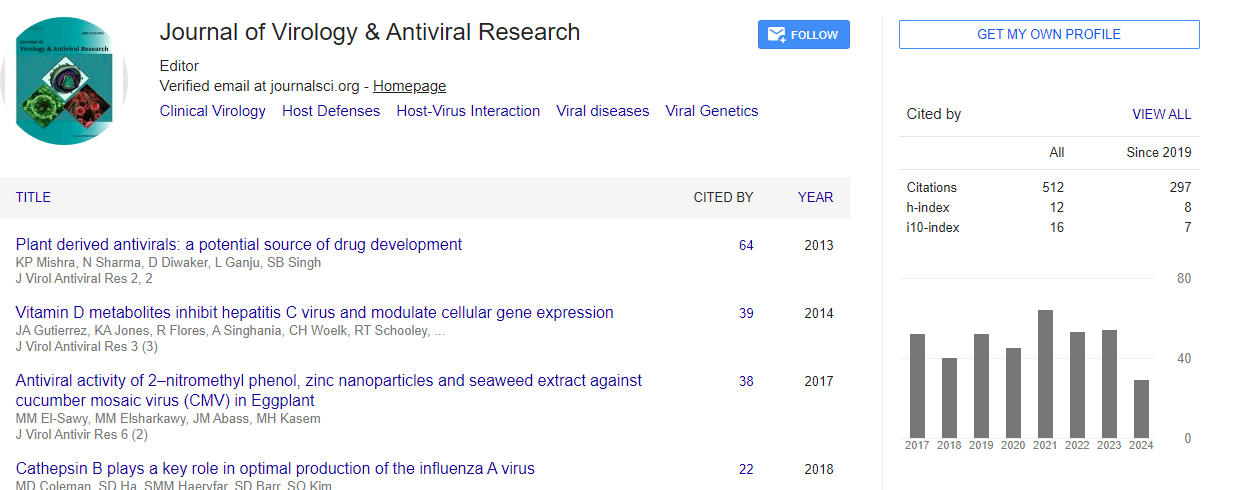Perspective, J Virol Antivir Res Vol: 13 Issue: 1
Controlling Viruses for Cancer Therapy: The Promising Frontier of Viral Oncolytics
Tae Ho Kim*
1Department of Medicine, Medical Research Center, Pusan National University, Yangsan, Republic of Korea
*Corresponding Author: Tae Ho Kim,
Department of Medicine, Medical Research
Center, Pusan National University, Yangsan, Republic of Korea
E-mail: thkim@pusan.ac.kr
Received date: 26 February, 2024, Manuscript No JVA-24-136883;
Editor assigned date: 28 February, 2024, PreQC No JVA-24-136883 (PQ);
Reviewed date: 14 March, 2024, QC No JVA-24-136883;
Revised date: 22 March, 2024, Manuscript No JVA-24-136883 (R);
Published date: 28 March, 2024, DOI: 10.4172/ 2324-8955.1000691
Citation: Kim TH (2024) Controlling Viruses for Cancer Therapy: The Promising Frontier of Viral Oncolytics. J Virol Antivir Res 13:1.
Description
The emergence of oncolytic virotherapy represents a promising avenue in cancer treatment, leveraging the natural ability of viruses to infect and replicate within tumor cells while sparing healthy tissues. This research article provides a comprehensive overview of viral oncolytic therapy, including its mechanisms of action, the current landscape of viral vectors, preclinical and clinical developments, challenges, and future directions. By exploring the diverse array of oncolytic viruses and their potential applications, this article aims to shed light on the transformative impact of viral oncolytic in the field of cancer therapy.
Cancer continues to pose a significant global health burden, necessitating the exploration of novel therapeutic approaches that can effectively target malignant cells while minimizing systemic toxicity. Viral oncolytic therapy has emerged as a promising strategy, capitalizing on the inherent ability of certain viruses to selectively infect and replicate within cancer cells, ultimately leading to their destruction.
Mechanisms of action
Viral oncolytic therapy exploits the unique biological properties of viruses to selectively target and destroy cancer cells. Oncolytic viruses are engineered or naturally occurring viruses that exhibit a preference for infecting and replicating within tumor cells due to alterations in the tumor microenvironment, such as defective antiviral responses and overexpression of cell surface receptors. Upon infection, oncolytic viruses undergo replication within cancer cells, leading to cell lysis and the release of viral progeny, which can further propagate the oncolytic effect. Additionally, viral infection can stimulate immune responses against tumor cells, enhancing the overall therapeutic efficacy of viral oncolytic through the induction of antitumor immunity.
Current landscape of viral vectors
A diverse array of viruses has been investigated for their potential as oncolytic agents, each possessing unique characteristics that influence their efficacy and safety profiles. Adenoviruses, herpes simplex viruses, measles viruses, and vaccinia viruses are among the most extensively studied viral vectors in clinical trials. Furthermore, advances in genetic engineering have facilitated the development of recombinant oncolytic viruses with enhanced tumor specificity and therapeutic payloads, including cytokines, prodrug-converting enzymes, and immune checkpoint inhibitors. Moreover, the advent of synthetic biology techniques has enabled the rational design of oncolytic viruses with customizable properties, paving the way for tailored therapeutic interventions against various cancer types.
Preclinical and clinical developments
Preclinical studies have demonstrated the efficacy of oncolytic viruses across a spectrum of malignancies, including melanoma, glioblastoma, breast cancer, and pancreatic cancer, among others. These studies have provided valuable insights into the mechanisms of viral oncolytic, tumor tropism, and immune modulation, laying the groundwork for clinical translation. In clinical trials, oncolytic viruses have shown promising results in terms of safety, tumor selectivity, and therapeutic efficacy, both as monotherapy and in combination with conventional treatments such as chemotherapy and immunotherapy. Notably, several oncolytic viruses have received regulatory approval or orphan drug designation for the treatment of specific cancer indications, underscoring their potential as viable therapeutic modalities.
Challenges and future directions
Despite the considerable progress in the field of viral oncolytic, several challenges remain to be addressed to maximize their clinical utility. These include the optimization of viral delivery strategies to improve tumor targeting and penetration, overcoming pre-existing immunity against oncolytic viruses, and minimizing off-target effects on normal tissues. Additionally, further research is needed to elucidate the complex interactions between oncolytic viruses and the host immune system, with the goal of enhancing antitumor immune responses and preventing immune evasion mechanisms. Moreover, the development of combination therapies incorporating oncolytic viruses with other immunomodulatory agents holds promise for synergistic anticancer effects and overcoming resistance mechanisms. Continued investment in preclinical research, clinical trials, and translational studies is essential to unlock the full potential of viral oncolytic and establish them as integral components of the cancer treatment armamentarium.
Conclusion
Viral oncolytic therapy represents a rapidly evolving field with significant potential to revolutionize cancer treatment paradigms. By harnessing the intrinsic oncolytic properties of viruses, researchers have developed a diverse array of viral vectors capable of selectively targeting and destroying tumor cells while eliciting potent antitumor immune responses. While challenges remain, ongoing advancements in viral vector engineering, immunotherapy, and combination strategies hold promise for overcoming these obstacles and maximizing the therapeutic efficacy of viral oncolytic. Ultimately, the continued exploration of viral oncolytic therapy offers hope for improved outcomes and enhanced quality of life for cancer patients worldwide.
 Spanish
Spanish  Chinese
Chinese  Russian
Russian  German
German  French
French  Japanese
Japanese  Portuguese
Portuguese  Hindi
Hindi 

